THOM THE WORLD POET: A LIFE IN POETRY
By Liz Hall-Downs
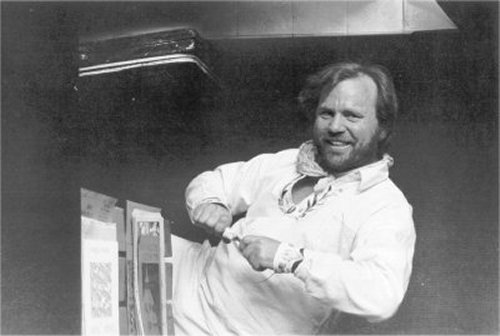
[Above] Thom at Cafe Jammin, Middle Park, Melbourne, December 1983. (Photo by Lee Waddell, 1983)
Memory can be a strange and complicated thing. Ask any five people who all attended the same event twenty years ago the question 'What happened? And why?' and the answers and justifications will amaze the listener in both their variety and in their points of divergence. In the Melbourne poetry scene of the 1970s and 80s, Thom the Poet achieved a kind of iconic status that continues to this day. Over the past twenty years, I've heard many, many stories about these times from a vast number of people, all claiming connection, influence, inside knowledge. I believe this is because Thom and the Street Poets took their work to the streets in such an anarchic fashion and, in doing so, reached so many with their unique brand of positive idealism.
Some were touched, some were appalled, and some wrote the work off as irrelevant. Some, in hindsight, ascribe motivations and ideologies that were not articulated at the time. I didn't personally become involved with the Street Poets until 1983, so the text I have written is based on an amalgam of what various people have told me. But it is always difficult to know what is actually objective truth and what is hearsay or gossip that has been distorted, 'Chinese whisper' fashion. I decided the best way around this was to run the text by Thom and insert his responses. They appear within this text in italics.
In 1969, a young man - the eldest son from a large Catholic family from Brisbane's northern suburbs - became the first member of his family to attend university. Enrolling in an Arts/Law degree at the University of Queensland, he also became involved in the Student Union and eventually became the editor of 'Semper Floreat', the university's student newspaper. There were advantages in this. His father was a violent alcoholic and his home life was miserable. Being an editor meant having an office. Having an office meant having a place to sleep.
These were years of arch conservatism in Queensland, and as the western world's countercultural explosion amongst the young began to take hold, so also resistance to this counterculture by those in authority became more and more oppressive.
The young man published an article on bomb making - a youthful 'up yours', a deliberate red rag to the status quo. The Queensland police stormed the campus, beat up the young man, and burned every copy of the student newspaper.
I have never published anything on bombmaking. SEMPER FLOREAT's Commemoration issue 1969 contained a poster - KISS A COP FOR COMMEM - and articles on drugs and lesbianism - which led to the issue being burned by the police. One archival copy remains in UQ library to authenticate both contents and articles. Prior to this 'Semper' (which is still going) had editors like Humphrey McQueen et alia - and in 1969 was being distributed in newsagents in Brisbane, distributed by Gordon and Gotch, and with artistically designed covers - a leap forward in professionalism. [The ABC television programme] FOUR CORNERS that year quoted the paper and said it was the best in Australia. Prior to 1969, town and gown were two different worlds - I am not sure if SEMPER has any off-campus distribution as of 2003.
The young man became radicalised - Australia was, after all, supposed to be a democracy with a tolerance and respect for free speech. He took the moniker 'Tom' (short for 'To Melbourne') and travelled south. His first stop was the first Aquarius Festival, held in the small town of Nimbin in northern New South Wales. There was a band playing on the steps of the old Butter Factory, and 'Tom' felt compelled to join in. He wasn't much of a singer, so he chanted instead. And was surprised and exhilarated to see the people dancing, and to feel a part of the collective energy emanating from the stage.
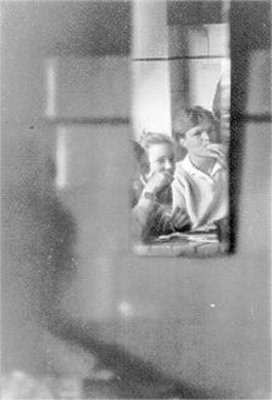
|
There was no band on the stage of THE BUTTERY - I started chanting THIS IS YOUR LIFE GET UP AND DANCE over and over-musicians came up behind me and joined in. This was the genesis of POOR TOM's POETRY BAND, which [soon after] had a residency Monday nights at the COMMUNE in North Melbourne (set up by Bob McMahon - later known as Bob Mud). We improvised - anyone who turned up was in the band - SAM ANGELICO (magician) was our drummer - ANDRE (bass) was 14 years young - ROGER DINER (guitar) later became a Jewish rabbi, and a cast of illumined musicians came through as they willed. We were hired by Ros Bower of the Australia Council to join MacKenzie Theory and the Australian Ballet at Sunbury Pop Festival in 1973 - when Billy Thorpe was king. We performed at many hippy Festivals and venues - VINCE AND WENDYS, SUNFLOWER, RAGLAN CAFE, PARACHUTE, THE POETRY GALLERY, THE NEW COMMUNE etc - self-management was the mode - we also played La Trobe University at a Union Night, as well as Greville Street Festival and TF Much Ballroom. |
[Above] Reflected audience at Cafe Jammin, Dec. 1983. (Photo by Lee Waddell, 1983)
This was the genesis of the Street Poetry movement, which subsequently emerged in Melbourne. Many poets, artists, dancers and musicians have come and gone from both its venues and its ideology over many years, but one figure still remains. Tom, in 2003, is still on the streets and in the cafes, but now those streets and cafes are in America and the U.K. as well as Australia. He has become a 'World Poet', and is still practising what he began in Nimbin all those years ago.
This is not the kind of poet the word so often denotes - fusty, book-bound, introverted. This poet was alive, 'out there', an advocate of orality. He had no time for academia and literary movements; he had no time for editing and fussing over his texts; his time was spent writing and printing reams of original poetry, and creating welcoming spaces in public places for people to gather and explore both their own and each other's creativity.
Re: EDITING - some of my written texts are self-edited - most are extemporaneous. Improvisation is the key. When a poem is re-visited - it becomes a different poem. The oral tradition allows for more freedom than Caxtonian/Newtonian uni-verses. Paper was
only one medium - LIVE was the best - tape,cassette, CD - but the moment is everything.
Oral Thom Poem (transcribed by Merrill Findlay, 1988):
Speak to me. Your tears don't translate. Your smile might be a mistake. Your body language needs subtitles. Even video text is edited and movies manipulate. So talk. And let your language communicate.
Poetry is significant speech. The best words in the best order. And the sharpening of our tongue means self-preservation. Beyond our words, more meanings lie to be trapped and captured. They are prizes for the alert and sentient. Our language is a metaphor. A simile of moving bars of music. It sings.
It has a frame of reference called The World Language. This is simply how we choose to speak to one another. We are consenting partners. Let us talk now. About poetry. As a primary art form. - Thom the World Poet
To the best of my knowledge the following is true: that a group of young, mostly unreservedly leftist, poets got together in Melbourne in the early 1970s bound by a collective desire to bring poetry back into people's consciousness by giving it away on roneoed, double-sided sheets to passers-by in public places.

|
The countercultural realities of Melbourne in the 70s and 80s: poetry was on the streets and we were part of it - handing out thousands of free sheets of anyone's poetry (at our own expense) for some 15 years - at first outside Princes Bridge Station from 5.30 a.m., then when the City Circle cut out pedestrian traffic - we moved to the Bourke Street Mall at lunchtimes … handing out poetry for the sheer joy of it!
I've heard many accounts (from a variety of sources, all claiming to have been involved, and all with wildly differing versions of events) of those early days. From what I understand, two of the main players were Tom and PiO, the Greek-Australian poet.
They, and their respective friends and acquaintances, started the anarchic spread of poetry on the streets, and adhered to the concept of the 'Open Stage' venue.
It appears the initial honeymoon phase fell apart fairly quickly, some say because of a dispute over whether to sell Street Poetry or give it away. Tom was totally opposed to the idea of selling poetry. The poets lined up according to their views on the subject. |
[Above] Mime Artist, poet, storyteller, and resident fairy, 'Yes Indeed', Cafe
Jammin, Dec. 1983. (Photo by Lee Waddell, 1983)
PiO and his core group - comprising such interesting characters as the Dadaist poet Jas H. Duke, Thalia and Jeltje (among others) - went their own way, going on to start the magazine '925' (poetry about work, much of the material obtained by doing writing workshops with factory workers), 'migrant 7' (poetry about the migrant experience), and 'r' (poetry about the health system, both from a workers' and a patient's perspective). As 'Collective Effort Press', this group has continued to publish anthologies and solo books, with some success. What comes through in all of these publications over more than 25 years is a commitment to social justice, expressed through the egalitarian artform of poetry.
Re: SCHISM-the PiO crew did not split on the issue of selling poetry. We were fantasists and optimists - they were social realists and revolutionaries. We were not that .We were individuals freely aligned temporarily solely by free will and friendship. We had no career path (still have none) - no grants - no business - only shared pleasures. They were MUCH angrier than us. Basically it boils down to friendship circles. We were anonymous, humorous and hilarious. Fools for joy. We enjoyed our nights intrinsically - they were not stepping stones - they were destinations in themselves. And they do not exist today. Everything has changed. And that is good!
The Street Poets developed in a different direction and, by the time I came in contact with them in 1983, were running regular venues under the motto: 'Open Living Free'. They gave away thousands of sheets of people's poetry in central Melbourne, and even ran a 'Dial-a-poem' service (advertised on Street Poetry sheets) where anyone could call a number at any time and encounter a real live poet ready and willing to share their poetry over the phone.
All this might sound bizarre - a 'publish-all-comers' and 'let-anyone-on-the-stage' ethos certainly doesn't guarantee excellence - but for me, as a young writer with piles of poems in my bottom drawer that had never been shown to anyone, it seemed safe and non-threatening. I was also influenced by the earlier experience of being handed a sheet of Street Poetry as a schoolgirl in the mid 70s. I took it home to stick on my wall, and fell in love with both the poem and the poet.
The poet's name was Deb Hall. Her poem was a love poem that used extended metaphors about the sea and the night to describe devotion in a love relationship. I read it often over several years. When I met Deb almost a decade later I was struck by how uninterested she was in being part of the pub readings push or the mainstream literary scene. (The former was developing around the same time, spurred on by the formation of the Poet's Union in the 70s.) Deb just wasn't that kind of poet. She never did public readings, rarely patronised even the Street Poetry venues, and only published with Street Poetry. Over twenty years, Deb's deeply felt writing was of a consistently high standard, but she wasn't in it for the recognition - she simply loved poetry. This is precisely the point. Not everyone who writes creatively necessarily wants to do it full-time. The drive to self-expression itself and the process of sharing it with other ordinary people - and the sense of connectedness this brings - can be reason enough. In other words, we're not looking at a literary movement as such; this is more an example of 'Community Cultural Development' (something you can now study at university) long before that term entered the lexicon.
I REALLY like your selecting DEB HALL as a representative Street Poet - she epitomised the ideals and the idealistic nature of Street Poetry - anonymous, populist, humorous, accessible, human, warm, loving, giving, friendly. DR ROD BRETHERTON was another - a bush poet /doctor who was one of the pioneering abortion doctors in Victoria - brave and bright! STEPHEN WHITESIDE - another humorous balladeer, also a doctor - a pivotal Street Poet.
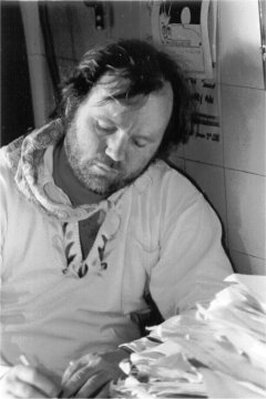
|
We started MANY venues - from the RJ HAWKE hotel in Coburg - we had venues at the ALBION HOTEL, CARRINGBUSH LIBRARY (The Tiger and The Butterfly readings-with CARMEL BIRD presiding), LIVING ROOM THEATRE (with Anita Sinclair) - full theatrical setting - lasted a year with a weekly Saturday night poetry concert costumed and scripted. [These included]: GOD SMOKES DRUM (Carmel Bird); FITZROY STREET ANGELS (Gilli Smyth); RETURN OF THE ALIEN (Daevid Allen); LOVE POEMS - Patrick Brian Cox.
It was Daevid Allen who set up CAFE JAMMIN poetry one night - then left it to me to run for three years! We were an inner city tribe - with friendship links to the Unemployed Worker's Union (we had a weekly venue at the Old Fire Station squat on St Georges Road, Fitzroy), LINKUP (we opened our homes to the homeless), the FREE STORE (we donated cars and clothes and food to this brave experiment on Smith Street), 3CR Radio - we had PEOPLE IN PERFORMANCE running for years with KEN SMEATON, HARRY WILLIAMSON and GILLI SMYTH etc.
Other venues - we performed in pubs like the PERSEVERANCE, with people like the late REX BUCKINGHAM (gentle butterfly poet), CHRISTINE KING, STEPHANIE McKAY, JOHN DALLIMORE … |
[Above] Thom writing for immediate performance, Cafe Jammin, Dec. 1983. (Photo by Lee Waddell, 1983)
We did midnight to dawn poetry shows on 3CR - poetry for 6 hours non-stop. We LOVED marathon efforts like the Down To Earth Festivals where the open access stage allowed ALL to be heard - all ages, sexes, all opinions - no censorship, no editing-just truth spoken freely.
Street poetry venues abounded in 1970s and 80s Melbourne, as did readings in pubs. By the time I encountered the 'scene' in 1983, there was some crossover between the venues but their respective ambiences were totally dissimilar. At the pub readings I met established poets whose work I'd admired, but I was often disappointed by their behaviour. The pub readings were not easy places for young women to read at the time.
Sexual harassment was rife, with the result that women were poorly represented. But it was at these readings that one met editors, publishers, movers and shakers. As I refused to tolerate this treatment, or to be excluded on the basis of my gender, and because much of my writing at this time reflected my own struggles with sexual politics, I was often pilloried by drunk male poets as a 'feminist bitch'. Ultimately, frustration with this situation produced the 'Bitchpoem', a piece that deals with these concerns and is probably the most well known poem I have ever written.
It was the Street Poetry venues that kept me writing and participating through the 80s, most specifically the Café Jammin in Middle Park, just a stone's throw from St Kilda. These café readings had a totally different vibe. As well as poets, there were hippies, oldies, punks and Rastafarians, musicians, dancers, single mothers and their kids. Some nights eighty percent of the audience would take their five minutes on the stage. It was exciting, vibrant, often amateurish, and wildly supportive. It was here that I learned to perform, to not bore the audience, to use a microphone, mix on stage, sing in public, gain confidence in my own material.
Many others went through the same process. Street Poetry provided a real alternative to the pubs and the literary establishment. Its philosophical commitment to a community arts model made it inclusive rather than exclusive, its idealism attracted free thinkers, and although a fair proportion of the work being given away on the streets was not of a particularly high standard, it gave many beginning poets a start. Now established poets on the Melbourne scene who often read at Street Poetry venues in the 80s include Lauren Williams, Kerry Scuffins, Ken Smeaton, Myron Lysenko, Komninos, Lisa Jacobson, Adrian Rawlins, and Pamela Sidney.
When psychedelic spoken word and music collaborators Gilli Smyth and Harry Williamson ('Mother Gong') moved from England to Melbourne in 1984, it was the Street Poets that welcomed and appreciated them. (Conversely, I once saw them in performance at a 'literary gathering' being told to 'get that synthesiser off the stage', as though musical backing with poetry was some sort of sacrilege.) The rainbow region contingent (such as Nimbin's 'Silly Symphony' and 'Gong's Daevid Allen) made regular forays down south, and the Melbourne-Mullumbimby connection was born.
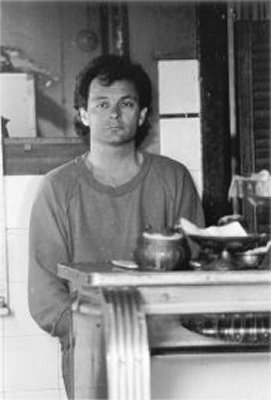
|
Groups of university-based poets from Armidale also came to the venues. The connection with the alternative lifestyle movement was always very strong.
DAN BYRNES set up TAMWORTH /ARMIDALE Street Poetry; DAVID KARY set up SYDNEY STREET POETRY; a 15 year old poet set up ADELAIDE STREET POETRY. GEELONG STREET POETRY was set up by Stuart McDonald - a genial Irish artist whose grandfather fought at Eureka. We performed at the METRO CAFE in Ryrie Street, Geelong, regularly - and also at the PORT FAIRY FOLK FESTIVAL.
Poetry and music was our thing - improvising our young lives bravely and happily. We gave our art away and shared our time with friends - living in communes and sharing food, cars, resources. I remember being evicted when I lived in a flat in North Melbourne when I allowed homeless folk to stay - and I was evicted BECAUSE I allowed them to stay!
JOHN HOWLEY (famous Oz painter) allowed us to perform at his art gallery in St Kilda, then at his skating rink in Williamstown. We did the Fringe Festivals in Fitzroy and Carlton, and performed at the PRAM FACTORY and LA MAMA. Anthologies like CARRINGBUSH ANTHOLOGY (based at the Library), LA MAMA POETICA, and all those pub anthologies, [contained work by Street Poets]. |
[Above] Peter Robb, proprietor of Cafe Jammin, supporter of poets, maker of
great cappucino and toasted sandwiches, and drummer in the resident reggae band, 'Cool Bananas'. (Photo by Lee Waddell, 1983)
The Street Poets did marvellous things in those years. A 'poet's village' was a regular fixture at Down-To-Earth festivals, offering 24 hour poetry to all comers and a ready-made audience for the first timers. In 1986, we staged 'Poets for Peace' and showcased over 50 poet-performers as well as bands, peace groups, and the obligatory open stage. We did countless gigs at fundraisers and gatherings for like-minded groups, and ran poetry stages at community festivals and fetes. Tom, with no arts funding, ran around like a dynamo, convincing people to get involved, to share, to have fun with it all, to stop being so darned serious about their precious writing. Throughout the decade, the Street Poets had strong links with groups such as Friends of the Earth, Movement Against Uranium Mining, Down-To-Earth, the Unemployed Worker's Union, the permaculture movement, and Animal Liberation.
By the time I left Melbourne for the rainbow region in 1991, changes had occurred. Some poets were starting to really 'perform' their work without the prop of a written text, the Slam movement was burgeoning in America, and regular slams had sprung up at the Esplanade Hotel in St Kilda. The divide between the pub and café venues lessened, and more gender balance was achieved. Around this time, Tom became 'Thom'; he left Australia to live in the USA, and became a 'World Poet' instead of a 'Street Poet'. Without his constant energy, the venues closed, others opened, morphed and changed in emphasis. The name 'Street Poetry' still crops up at certain venues, but it does not really exist now, except in people's memories.
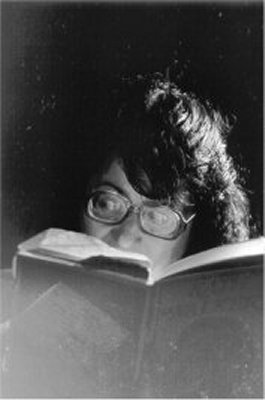
|
Essentially what was created was a people's movement that affirmed the right of the individual to be creative without necessarily demanding excellence. The fact that some excellent poets emerged from the venues is by-the-by.
Here's Thom explaining the 'why' of Street Poetry in an interview with Merrill Findlay from the 1980s: 'Children automatically know the rules of fantasy. Yet we constantly have to rediscover how wide our freedom really is'.
It is this freedom - of thought, speech and expression - that Street Poetry sought to give back to ordinary people, as an antidote to the consumerist, television-watching passivity that our culture encourages. It is this 'freedom' that led people like myself to begin to see ourselves as creators, and not just consumers, of culture.
To my mind, the Street Poetry movement embraced the following 'fundamentals':
- revival of the oral tradition
- community participation
- non-censorship, non-academic
- openness to a variety of ideas and approaches
- inclusiveness, not exclusiveness - all created equal, no 'star system'
- emphasis on improvisation and experimentation, eg. 'Poor Tom's Poetry Band' |
[Above] Mary Grace Levakis, Street Poet, Cafe Jammin, Dec. 1983. (Photo by Lee Waddell, 1983)
Open, Living, Free were the keynotes for all Street Poetry enterprises. Street poetry erupted in Adelaide, Tamworth, Sydney and Armidale - but the epicentre was always Melbourne with its horrendous weather and indoor culture - poetry was, and is, perfect for interior meditations. Improvisations with music and dance were the norm and the basis of Poor Tom's Poetry Band which allowed anyone to play in the band and never practised, only performed. Evidence of Street Poets exists in the Ephemeralia collection at the Victorian State Library, and in the individual memories of surviving poets. This is a chapter in the cultural life of Australia - a precursor to the present revival of verbal culture.
I was featured in THE AGE for standing on the corner of Swanston and Flinders from 5.30 to 9.30 daily and handing out 5000 sheets of poetry to folk on their way to work. AMAZING things happened - police told me in advance to shift my illegally parked car so they did not have to book me - people were so open and kind because they KNEW it was only poetry - not politics or religion - a TRUST existed - in free speech and harmless free expression. Other participants worth remembering include ZONK, a Tasmanian runaway who was a fine Street Poet until he joined the Krishnas -"more food-better dancing" - and many young poets who flew through Street Poetry. As it had no structure, just DO something was the motif - and everyone did! Most of us are still alive! ROBERT DICKINS was a fine Street Poet as was his lyricist friend, NEIL RICHARDS. We had poets in Castlemaine who set up venues for us, as well as ALICIA STAMMERS who set up WOMENS POETRY as a feminist adjunct to a male dominated scene. SELF MANAGEMENT was the theme - and SELF DETERMINATION the style! We did as we chose - each individual responsible for their own expression - definitely NOT a collective - just a circle of friends who actually LIKED the company of each other ...
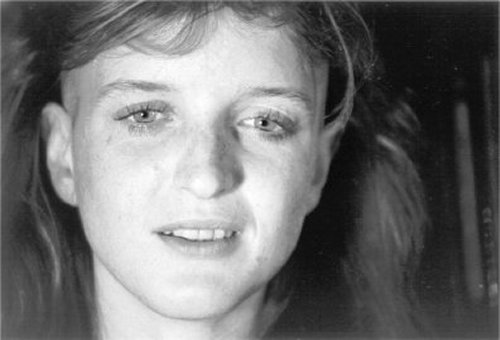
[Above] Liz Hall-Downs (then Liz Hall), Parkdale. (Lee Waddell, 1986).
An Interview with Thom the World Poet - conducted by email with Liz Hall-Downs, February 2003
LHD: Thom, about a year ago I presented some of this paper at an academic conference on the Gold Coast. One of the academics in the audience commented that "This talk is about something romantic, optimistic, and ridiculous - these people were a bunch of feral boat-rockers!" To which I replied, "Exactly!" It occurred to me that this description of Street Poetry would probably be pleasing to you - though I suspect it wasn't really intended in a complimentary way. Are you a 'feral boat-rocker'? What importance do you place on optimism?
THOM: Feral boat-rockers?
Nein!
We were actually VERY conservative. We were not criminal, nor violent. We were community based - open to all. We were more furry, cuddly, romantic idealists. We actually loved, and we rocked the boat - promoting dialogue on important issues like pacifism, the environment - LONG before it was ever fashionable. Our politics was personal.
Optimism is everything!
Generally speaking the Street Poetry poets were good citizens and good people - loving, kind, wise, generous, gregarious, eclectic volunteers. They GAVE rather than TOOK - they healed rather than plundered - they were idealists rather than pragmatists. They were innocent.
LHD: At the same conference, someone else remarked that 'performance poetry' is to poetry what Grisham and other writers like him are to fiction - that there is a 'desire for celebrity' in populist writing and writers, as opposed to the 'desire for recognition from academia' that more 'literary' writing seems to go for. Yet I don't see you chasing either academic approval or 'celebrity', instead choosing a marginalised artform that is often practised badly by its purveyors, and sometimes produces rare moments of incredible inspiration. What drives you then?
THOM: The moment. And all possibilities therein. 90 books, 25 CD's, 40 cassettes - all improvised. More to come. The best poem - is the NEXT poem!
Celebrity is a lie - you can die of exposure.
Academics are generally self-referential careerists
(who ever did a treatise on Street Poetry except a Street Poet?)
And a book is only one way to deal with text.
Be open to all.
Follow no one.
Beware of what people say.
Be aware of what people say.
Do not believe your own poems
(90% assertion, 10% hot air).
LHD: You seem to have chosen poverty and anonymity when you could have had a nice, secure legal or academic career. Why?
THOM: I did not choose poverty - I chose POETRY! Anonymity is a luxury - I luxuriate in the warm glow of its rays of freedom.
LHD: You left Australia for the USA in the early 90s, and never returned. Was this a conscious 'abandoning of the ship'? In what ways did American culture influence and change your approach? How does the grass roots there compare with Australia?
THOM: I did not leave Australia - I went (as always) towards love. I am only in America because my love is here. If there were love - that is where I would be.
Emergence is everywhere - [the] same threatened species of individual optimists - same ghettos, colonies, coffee shops instead of pubs ...
LHD: Over the years I've met many people who claim to have been influenced by you, either through attending Street Poetry venues, receiving Street Poetry sheets on the streets, or becoming Street Poets themselves. Were you aware of this ability to influence others when you first started performing, and has it been a blessing or a curse?
THOM: No one has ever accused me (personally) of influencing them.
My experience is the reverse - people deny my existence!
I AM ALIVE! is my International Anthem-despite the rumours!
LHD: Baby boomer men, in particular, often have stories to tell about you, usually involving competition over women. I've seen over many years how women seem to connect with you, both as an artist and a person, and how this has sometimes engendered bitterness and jealousy. Would you describe yourself as a feminist?
THOM: No - I am a human being - with faults, flaws, weaknesses and limits - and I LOVE being here. Other human beings know me - we sniff each other out and enjoy ourselves together!
LHD: You're now based in Austin, Texas, still touring and running café venues. You've supported acts as diverse as Bob Dylan, Hawkwind, Kangaroo Moon, and Gong, and collaborated with many, many musicians, both in a live context and on CD. Yet you're still relatively 'unknown' and certainly not earning a living from this work. At the ripe old age of 52, how do you maintain your enthusiasm?
THOM: Because I breathe
Because I love my life
Because I am loved (and choose to love)
Because I am alive
Because nothing matters
Because EVERYTHING matters
Because I am not just matter
Because I can make this up as I go along
Because of poem
Because of song
PS: I also supported RUSSELL CROWE at 3 of his Texas shows - 4000 women - every
night - all SWOONING - FOR HIM! WOW!
LHD: More and more, I've noticed that orality seems to have taken over in your work. You seem to thrive on spontaneous creativity in a performance context and be bored by more conservative, literary forms such as mainstream publication. Do you see orality as a more effective means of communication in the new millennium?
THOM: I started improvising - that was my doorway to poetry.
I trust speech.
I am aware that the oral tradition is older than time,
that linear thinking is a box,
that voice is the choice of our human species,
that abuse by priests, politicians, advertisers has devalued oral currency.
I LOVE radio - GOON SHOWS, FIRESIGN THEATER, LAKE WOBEGONE,
3CR, CD's and verbal improvisatory performances.
I would like to listen as well as speak.
I enjoy mutuality.
LHD: Will 'Thom the World Poet' ever retire? Or do you intend to drop dead onstage when your time comes?
THOM: I will never die!
I am just starting to come alive!
I will live forever
and you do NOT have to believe a word I say!
Just go ahead and try to forget this ever happened - ok?
LHD: Anything else?
THOM: Just that we were all quite young and positive and keen to lift the vibe - all volunteers and based in free will alone - we did not think of ourselves as anarchists but volunteers. Venues existed because they needed to. Today is different - what happened then cannot happen again. Everything and everyone has moved on. But it DID happen. And it WAS a good thing.
The chief value of this history is to encourage new people to take risks - to be brave in their own time - to go beyond the borders of acceptable literature and create what they will in 2003 and beyond. There ARE young people who need to know they are part of a culture that is healthy and happy and hale and hearty - the flag of freedom needs to be passed on.
Credits:
Parts of this text previously appeared in "Alternative Australia: celebrating cultural diversity" (Alan Dearling, Ed., Enabler Books, Dorset, UK, 2000). An earlier draft was presented at the conference "The Creative Arts Degree: Research and Policy", Griffith University, Gold Coast, 11 Feb. 2001 as "Poor Tom and the Poets: the Melbourne Street Poetry Movement". Interview with Thom conducted by email Feb 12-13, 2003.
About the Writer Liz Hall-Downs
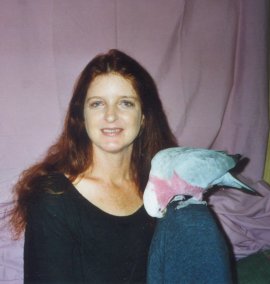
|
Liz Hall-Downs has been reading and performing poetry in public, on TV and radio in Australia and the USA, and publishing in journals, since 1983. Liz also writes fiction and essays and has worked as a community artist, writer-in-residence, editor and singer. She holds a BA from Deakin University (Victoria) with major studies in Professional Writing & Literature. Liz is currently living in South-East Queensland where she he has an MA (Creative Writing) from the University of Queensland. Current projects include an 'illness narrative' in poetry, My Arthritic Heart, and a realist novel, The Death of Jimi Hendrix. |
[Above] Photo of Liz Hall-Downs and Alice by Kim Downs, 2001.
I Next I
Back I
Exit I
Thylazine No.7 (March, 2003) |



